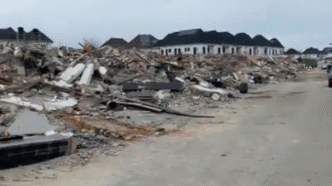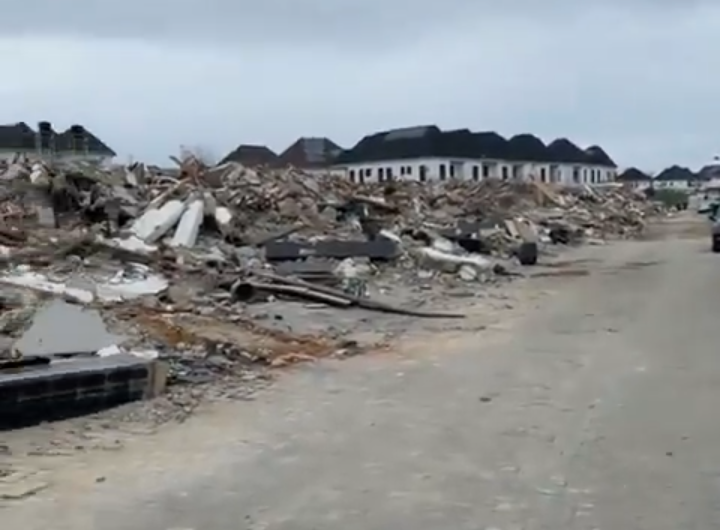The Lagos State Commissioner for the Environment and Water Resources, Tokunbo Wahab, has strongly dismissed reports alleging that the ministry demanded huge payments from property owners in Oral Estate, Ikota, to halt the demolition of houses within the estate.
The controversy began after a viral video circulated on social media, showing a woman claiming that Wahab and his officials initially demanded ₦1 billion and later reduced the amount to ₦700 million in exchange for suspending the planned demolition exercise.
In the video, the woman is heard saying:
“Thank God for today. We have peace of mind. We’re not hearing an excavator tearing people’s houses down, people crying. The Commissioner, Ministry of Environment came and we had an agreement that my estate is going to pay N1 billion for shit piling. It ended in N700 million for shit piling. My estate is trying to gather the money and give them this month.”
The allegation quickly went viral, sparking outrage among Lagosians and raising questions about transparency in the state government’s handling of building control, demolition exercises, and environmental enforcement.
Wahab’s Swift Response
In a statement issued on Sunday through his verified social media accounts, Tokunbo Wahab described the claims as false, malicious, and aimed at undermining the integrity of the Lagos State Ministry of the Environment and Water Resources.
He categorically denied ever demanding or receiving any money from property owners in Oral Estate or elsewhere, stressing that the Ministry’s operations are guided strictly by law and due process.
According to him, neither he nor any official of the ministry has asked for or collected “₦1 billion, ₦700 million, or a single kobo” in connection with the demolition of illegal structures.
“This administration under Governor Babajide Sanwo-Olu is committed to enforcing environmental laws and protecting the lives and property of Lagosians. We will not compromise this duty for personal gain or for the selfish interest of a few individuals,” Wahab stated.
He further warned residents against spreading unverified information, adding that such allegations could mislead the public and damage the credibility of institutions tasked with ensuring safety and sustainable development in Lagos.
Background to the Oral Estate Controversy
Oral Estate, located around the Ikota axis of Lekki in Lagos, has been at the center of disputes over building approvals, compliance with environmental regulations, and the legality of certain property developments.
Over the past few years, Lagos State authorities have intensified their efforts to remove illegal structures, reclaim drainage channels, and enforce building standards. The Ministry of the Environment and Water Resources, alongside the Lagos State Building Control Agency (LASBCA) and the Lagos State Physical Planning Permit Authority (LASPPPA), has repeatedly warned developers and property owners against constructing houses on drainage setbacks, waterways, and under high-tension power lines.
The demolition exercises in areas such as Ikota, Lekki, and Ajah have generated heated debates. While the state government insists that illegal developments worsen flooding and environmental hazards, some residents have accused officials of selective enforcement and high-handedness.
The viral allegation of a ₦1 billion demand only added to this tension, fueling speculation that demolition exercises may have been used to pressure property owners into making illegal payments.
Government’s Stand on Demolitions
Governor Babajide Sanwo-Olu’s administration has maintained that all demolitions are carried out in line with environmental and urban planning laws. Officials argue that uncontrolled development has worsened flooding across Lagos, particularly in flood-prone neighborhoods like Lekki, Ikota, and Ajah.
Tokunbo Wahab has consistently emphasized that the Ministry will not compromise on the need to clear drainage channels, remove illegal structures, and protect Lagos residents from preventable disasters.
In a recent policy statement, Wahab explained:
“We cannot allow illegal structures to continue blocking natural waterways. When it rains, thousands of Lagosians lose their homes, cars, and livelihoods because of poor planning. Government has a duty to protect the larger interest, even if it means taking tough decisions.”
The commissioner also reminded residents that the state regularly issues contravention notices, stop-work orders, and final warnings before demolitions are carried out. He insisted that those who choose to ignore regulations cannot later claim victimhood.
The Impact of Viral Allegations
The Oral Estate bribery allegation quickly spread across social media platforms such as X (formerly Twitter), Facebook, and WhatsApp groups. Many commentators expressed shock, while others argued that it reflected long-standing suspicions about corruption in urban planning enforcement in Lagos.
Civil society groups have also weighed in, calling for transparency in the government’s demolition and land administration policies. Some activists have urged the Lagos State government to publish detailed records of all enforcement operations, including cost implications, notices served, and affected properties.
However, Wahab’s firm rebuttal suggests the Ministry is not willing to allow its credibility to be undermined by what it describes as unsubstantiated claims.
Calls for Accountability and Due Process
Urban planning experts say the Oral Estate saga underlines the need for greater transparency in how demolition exercises are communicated and executed. Dr. Akinwunmi Olajide, an environmental consultant based in Lagos, noted that while demolitions may be necessary for public safety, the lack of clear public information often breeds mistrust.
“People need to know why demolitions are happening, whether due process was followed, and what the long-term plan is. If communication is poor, residents will naturally believe alternative narratives — even if they are false,” Olajide said.
He added that allegations of bribery, whether true or false, can seriously undermine the legitimacy of environmental enforcement efforts.
Residents’ Mixed Reactions
Within Oral Estate itself, reactions remain divided. While some residents expressed relief at the temporary suspension of demolition activity, others fear that uncertainty still looms.
A property owner who requested anonymity said:
“Many of us invested millions of naira in these properties. We are law-abiding citizens. If the state government wants to reclaim land or demolish structures, it should follow due process. What we don’t want is to be subjected to blackmail or uncertainty.”
Others believe that the viral video may have been a misunderstanding, taken out of context, or deliberately amplified by disgruntled individuals.
Looking Ahead
The Lagos State government has promised to continue its environmental enforcement drive, regardless of public controversy. Wahab has reiterated that the Ministry of Environment and Water Resources will not tolerate illegal construction on drainage setbacks, wetlands, or other protected areas.
Meanwhile, the allegation of a ₦1 billion bribe remains a flashpoint in the conversation about governance, accountability, and urban planning in Lagos. Observers note that the issue highlights the delicate balance between enforcing environmental laws and maintaining public trust in government institutions.
As the dust settles, one fact remains clear: Lagos, with its rapid population growth and rising environmental challenges, cannot afford to ignore the consequences of unregulated development. Whether in Oral Estate or other parts of the state, the need for transparency, due process, and accountability will continue to define the government’s relationship with property owners and residents.














